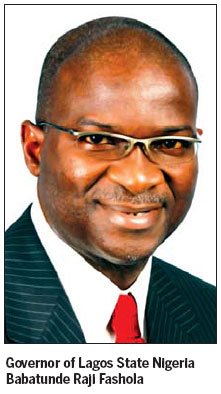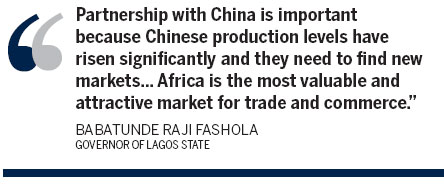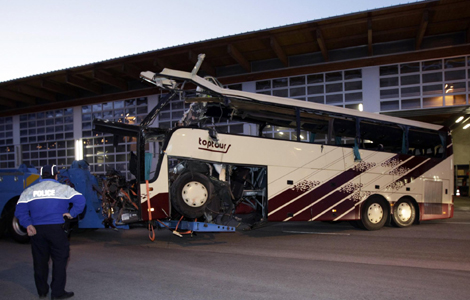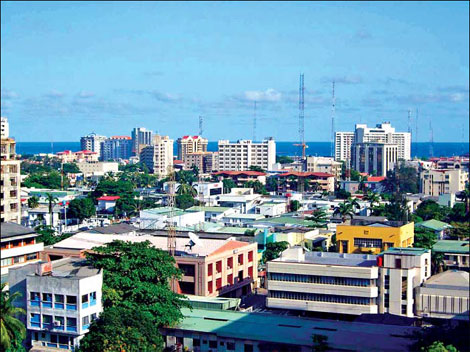Nation's powerhouse sets the standard
Updated: 2011-03-22 07:53
(China Daily)
|
|||||||||||
|
The city of Lagos, Nigeria's commercial, administrative and industrial nerve center. Photos provided to China Daily |
Lagos State is the nerve center of this resourceful, populous African country
As the man whose political mantra is: "We say what we do, and we do what we say!" Governor of Lagos State Babatunde Raji Fashola has done much to change the fortunes of Nigeria's most populous state since coming to office in 2007.
The 48-year-old lawyer, who was the State's former Chief of Staff, has earned a glowing international reputation for good governance, having worked hard to bring important social reforms and a sense of pride, unity and belonging to the 17 million people of Lagos, while his entrepreneurial attitude is attracting streams of new investments.
As Nigeria's powerhouse, the city of Lagos is home to 85 percent of the state population and is the country's financial, commercial and industrial nerve center, with more than 2,000 manufacturing industries and more than 200 financial institutions, including the Nigeria Stock Exchange, based there.
The State also houses the nation's monetary authority, the Central Bank of Nigeria and the Security and Exchange Commission, as well as harboring 60 percent of the Federation's total industrial investments and foreign trade while also attracting 65 percent of Nigeria's commercial activities.
It also accounts for more than 40 percent of all labour emoluments paid in the country, with the headquarters of multinational conglomerates such as UAC, Unilever, John Holts, BEWAC/VYB, Leventis, Churchgate, Chevron, Shell, Exxonmobil and the nation's giant public enterprises all located within the State.
Lagos State is not industrially saturated, however. There exists a vast potential of underdeveloped land in the Eti-Osa Area of Lagos, Badagry, Epe, Ikeja and Ikorodu Divisions.
And, in a bid to decongest the Ikeja and Lagos Industrial Estates and open up other areas for development, the State Government has provided small-scale industrial estates in all of the State's 20 Local Government Areas and 37 Development Councils.
Meeting challenges

Other challenges being tackled include a rapidly expanding population that UN estimates predict will make Lagos the third-largest city in the world by 2015, after Tokyo and Mumbai, and a lacking infrastructure.
Governor Fashola is committed to the State government working hand in hand with the private sector, especially on infrastructural initiatives. He speaks specifically about the investment that has already flooded in from China, since Lagos State and the southwest Chinese Municipality of Chongqing fostered links at the end of 2008.
"Partnership with China is strategic, not just in local terms, but in terms of a new global order if we consider the possibility of stopping poverty.
If the huge populations of China and Nigeria became the catalysts for pulling people out of poverty, it would present an enormous global objective for the planet.
"The partnership is also important because Chinese production levels have risen significantly and they need to find new marketsChina cannot consume more than it produces, and Africa is the most valuable and attractive market for trade and commerce."
Nigeria's President Goodluck Jonathan announced last year that the trade volume between the two countries had already risen from $3 billion to $7 billion between 2006 and 2010.
Now, with 60 percent of the Lagos State budget allocated to infrastructure renewal, there is scope for more Chinese participation, principally in the Lekki Airport and various transport projects.
As one of the most dynamic growth areas in Lagos State, the Lekki corridor provides an enormous opportunity to satisfy the increasing demands of the overcrowded capital, where the average density in the built-up areas is more than 20,000 people per square km.
A master plan for the Lekki Sub-Region includes several estates, gated residential developments, agricultural farmlands, areas allocated for a Free Trade Zone, an airport, and a seaport.
The Free Trade Zone, Fashola points out, already has a strategic joint venture with Chinese firm CCECC to expand the rail network there.
Investment is also needed to organize water supplies in several areas of the state. "There is a 70-million gallon plan that includes concessions and privatization," the Governor explained.
"We also need mass public housing. Lagos State remains ready to provide land as equity on a joint venture basis as we see partners who have the capital to build here. The market is ready-and there are five million houses needed," he said.
There have been considerable improvements in the efficiency and reputation of the public sector under Fashola's watch.
"It's as if the energy has returned to the state," he says. "There is a real willingness for everyone to participate in public life. The public servant is now a proud officer and there is increased interest from the private sector to do things with government.
"That has been a huge turning point for us and gives us the ability to attract more talented resources to complement what we had so far; it can only diversify and improve our situation. People are now saying they want to pay their taxes."
The State's various parastatal organizations are also preparing for increased partnerships in the future as they continue to strive to deliver vital services effectively.
Lagos State Water Corporation, for example, provides safe drinking water to more than 12.5 million people in Lagos State at affordable rates and maintains good quality services by collecting enough revenues to sustain effective operational expenses.
In the meantime, the Lagos Metropolitan Area Transport Authority (LAMATA) is working to raise the city's transport network to international standards and is currently working on a mass rail transit project under a Public Private Partnership, has already generated thousands of jobs, and will create many more once ancillary services are taken into account.
A highly successful Bus Rapid Transit is already in operation, which relies on the use of dedicated 'interference-free segregated lanes to guarantee fast and reliable bus travel.
China Daily

(China Daily 03/22/2011 page18)
Hot Topics
Wu Ying, iPad, Jeremy Lin, Valentine's Day, Real Name, Whitney Houston, Syria,Iranian issue, Sanyan tourism, Giving birth in Hong Kong, Cadmium spill, housing policy
Editor's Picks

|

|

|

|

|

|








